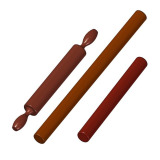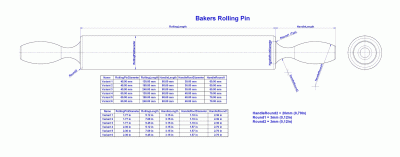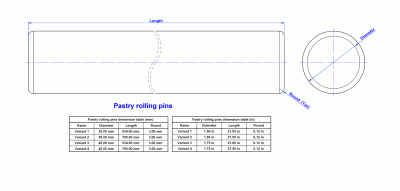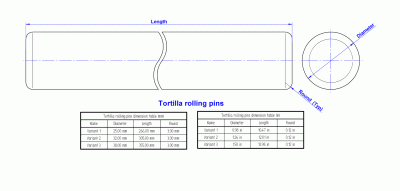We are offering you the plans for several types of rolling pins: Bakers rolling pin, Pastry rolling pin and Tortilla rolling pin.
Rolling pin is the food preparation utensil of cylindrical shape, used for the dough rolling and shaping. There are two basic shapes of rolling pins: a Rod type pin, which is a thin stick that has symmetrical cylindrical shape or tapered ends, usually 2-3 cm in diameter, and a Rolling (French) type pin, which is a thick cylindrical roller, usually 7-10 cm diameter with handles. Shape and size of rolling pins can vary considerably. Rolling pin with handles enables the dough preparation without needless touching of the dough with hands. Besides that, it can be quite thicker and heavier than the Rod rolling pin, so it makes dough rolling easier. On the other hand, rod type of rolling pin is thinner and can be longer, so it enables rolling of much larger pieces of dough.

Rolling pins can be made out of various materials, like wood, plastic, ceramics, various metals, marble, or silicone. Some of them are hollow, so it could be filled with warm or cold water and do the rolling of specific kinds of dough more efficiently. The rolling is easier and more effective if the heavy rolling pin is used. Regardless of all the materials listed above, the rolling pin is traditionally made out of wood.
The rolling pin is being used as one of the classic cooking utensils for food preparation since the times of the oldest civilizations. The oldest evidence about the existence and use of rolling pin dates from the 9 century BC – it was used by the Etruscans, who lived on the territory of Italy. It is considered that they have developed a wide range of cooking tools, and the rolling pin was one of them. They used it for the rolling dough for pasta and the bread made out of various grains that they grown – various drawings on murals, vases and walls of their tombs are giving the proofs about it. They used the classic, simple Rod-type rolling pin, while the Rolling pin with handles was invented by the end of 19th Century.



Rolling pins from our plan are the most commonly used types, and for each of them we made a few dimension variations, so we offer a total of 13 different possibilities. Nevertheless, the plans are very simple, so you can customize them to your needs and to the dimensions of material that you have. If you plan to make your rolling pin for practical use, and not just as decoration, we recommend making it out of single piece of wood by woodturning technique.
Wood for making your rolling pin must be free of defects for its full length. The most common length of rolling pins is from 30 to 50 cm. The best wood types for quality and professional rolling pin manufacture are hard maple, cherry, apple wood, ash and similar hard and durable hardwoods, while the soft maple and birch is used for the manufacture of handles, but also for some cheaper rolling pins.
Surface of the rolling pin should be sanded with two or more types of sandpaper. It is recommended to start with the coarse 80 grit paper and finish with very fine 150, or 220 grit paper, until the surface becomes perfectly smooth. Your rolling pin is now finished and requires no further coating of its surface.
Clean your wooden rolling pin simply by wiping the rest of the dough and flour with damp cloth immediately after the use, or by quick hand washing, and then dry it well. Keep it in a dry place. Do not immerse into the water or wash in the dishwasher, because the wood will crack.